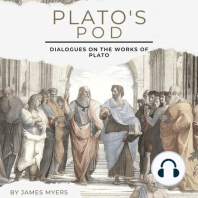115 min listen

Dialogue On Philebus: The One And The Many
Dialogue On Philebus: The One And The Many
ratings:
Length:
125 minutes
Released:
Jan 15, 2022
Format:
Podcast episode
Description
Can an algorithm care about its outcomes, and a computer observe itself? These were among the fascinating questions raised in our dialogue on the first part of The Philebus, when members of the Toronto Philosophy and Calgary Philosophy Meetup groups met on January 9, 2022. We began with the importance of distinguishing the one from the many, or the same and different, which is a key theme at the outset of Plato’s dialogue and the significant problem of categorization in today’s machine learning. Humans still excel in categorization and pattern-recognition, which Socrates points out is the way we derive meaning from speech and musical sound. Socrates raised the matter of the one and the many in his discussion with Protarchus when, in concluding the best life is a mixture of knowledge and pleasure, they investigate the difficulty of combining a function of limits and the unlimited. What is the appropriate ratio of the limits of knowledge and unlimited pleasures, in the mixture of the two for the good life? How do we attain a “limited understanding of the unlimited,” as one participant asked? Socrates emphasizes the philosopher’s knowledge of number and calculation to define equals, opposites, and intermediates in determining the proportions of the unlimited and the limited before understanding the cause of the resulting actions. Also highlighted is the ordering of empirical data in the rational process of deriving, and then recalling, knowledge through the application of reason. And so how do we distinguish between the one and the many? Many questions were raised, but perhaps one participant summarized it most clearly as a unification of dualities in our experience of time as a linear sequence: “You can’t wrap your mind around reality, because reality is wrapped around your mind.”
Released:
Jan 15, 2022
Format:
Podcast episode
Titles in the series (59)
Dialogue on The Republic, Session 4: Philosopher Rulers by Plato's Pod: Dialogues on the works of Plato